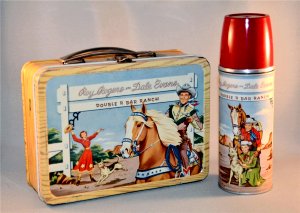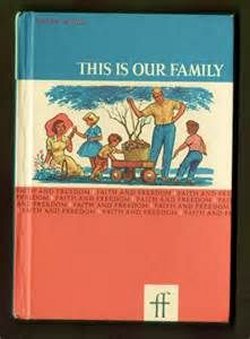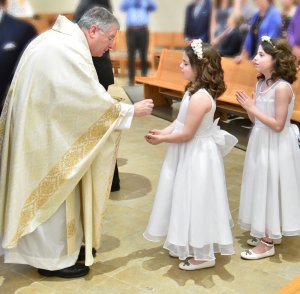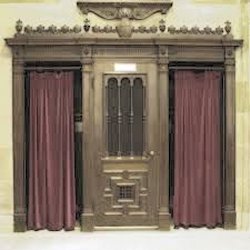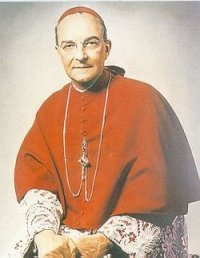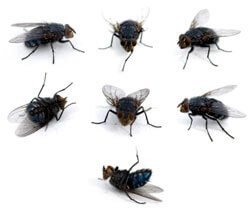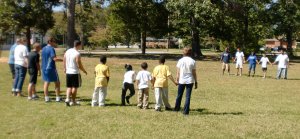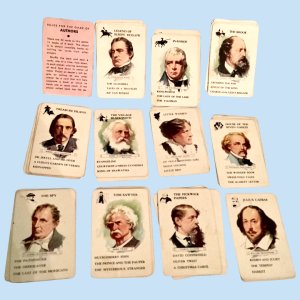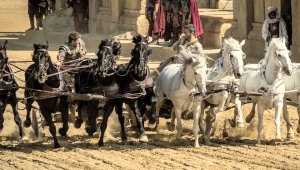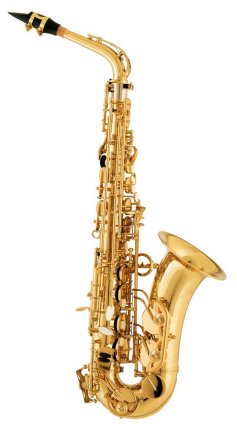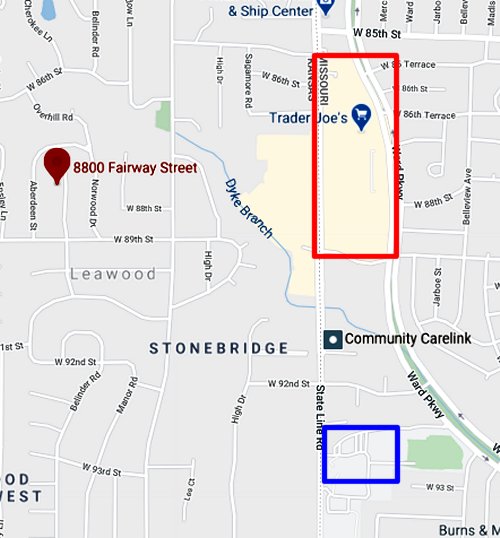Early years at Queen of the Holy Rosary School. Continue reading
After my parents and I moved from Kansas City, KS, to suburban Prairie Village in early 1955, I began attending Queen of the Holy Rosary School (QHRS) in Overland Park. The faculty consisted of Ursuline nuns who lived in a convent behind the school and a few lay teachers, all women. Back in the day my dad and his brothers had been taught by Ursulines. In fact, in 1955 a few of the nuns who taught my dad were at QHRS.
For all the years that I can remember the principal at QHRS was Sr. Dominica. To say that she ran a tight ship is an understatement. As at St. Peter’s, we were all required to attend mass before school. The youngest kids sat closest to the altar. Sufficient space between the students was enforced to accommodate each one’s invisible guardian angel.
Girls at QHRS were required to wear uniforms of plain blue skirts and white blouses. There may have been other requirements. I cannot remember the standards for the boys. I never cared about clothes at all. My mother generally bought pants for me at J.C. Penney. She probably got my shirts there, too.
At the time QHRS had no cafeteria. The students all brought their lunches in paper bags or lunch boxes. We ate at our desks in the classroom. I think that students could buy a small carton of milk for a few cents. Some kids traded food. Mine was always the best; I never traded.
A cafeteria of sorts was installed in one of the expansions, but I don’t remember ever eating lunch there. There certainly was never a kitchen for preparing lunches to sell to students. Students could buy cup-sized containers of milk.
I usually took the bus to school. The driver’s name was Bernardine. Two girls on our street also rode the Bluebird. Their names were Michaelene Dunn and Kim Somebody. They were a couple of years older than I was. Once or twice I used their wisdom and experience as a source for the meaning of taboo words, phrases, and gestures.
I was very happy to join Sr. Mildred’s first-grade class early. Sr. Mildred had actually taught my dad at Holy Name School in KC KS. She was a very nice person; all the kids liked her.
A few weeks after I joined the class I contracted all three common childhood diseases—measles, mumps, and chicken pox—one after the other. I was out of school for at least two weeks. I doubt that I missed as many days during my next seven plus years at QHRS. I remember no great difficulty with my lessons after rejoining my class.
One huge difference between St. Peter’s and QHRS was that at the end of every six-week period Fr. Ryan, the pastor of the parish, personally visited every class, called each student up to stand beside him, and read the grades aloud. If a student’s grades seemed to be slipping, he/she got grilled. I must be remembering this wrong. Fr. Ryan must have skipped some classes or some students. In any case, the effect was terrifying.
In second grade (1965-1966) I was in a combined class of first graders and second graders. The first graders outnumbered us by at least two to one. The teacher who received this unenviable assignment was Sr. Lucy.
Sr. Lucy habitually abandoned our class during the lunch hour, presumably to fix herself a stiff drink or take a sedative. During her absence we were not allowed to cavort or even to speak. One student was assigned the role of monitor. This lucky person was assigned the task of taking down the names of miscreants. After a while this nerve-wracking duty was permanently assigned to me. I must have been rather judicious. I was never depantsed or beaten senseless at recess.
I remember a few episodes from this class. The first one was when someone decided to stage a basketball game at recess between the second-grade boys in our room and the other group of second-grade boys. We only used one basket. There were no substitutions. Everyone played who was there. There was no referee. Only a few of us were able to get the ball up as high as the basket.
The other team had more than twice as many boys as ours. They won the game rather easily. I was still the biggest kid in our class, and I scored all of our points. I don’t know why I remember this pathetic exercise. Maybe it was the first time that I participated in a team event in which someone kept score.
One of the students, whose last name was Martindale, had trouble reading. His parents obviously helped him study the text beforehand. When called upon to read aloud, he would retell the story but he did not use the words of the text. Many of us giggled, but I don’t remember anyone ridiculing him about it.
By the way, we did not use the “Dick and Jane” books that were a staple at the public schools. The protagonists in our books were David and Ann. Every once in a while a lesson involving Catholic principles was included. I remember that their father lost his job at some point. Things like that never happened to Dick and Jane.
We second graders spent a great deal of time preparing for our first communion, which is, or at least was, a very big deal for young Catholics. As part of our preparation Sr. Lucy required us to memorize a list of items from our catechism,1 which consisted a set of questions and incontestable answers. The first two were:
Q: Who made you?
A: God made me.
Q: Why did God make you?
A: God made me to show forth his goodness and to make me happy with him in heaven.
When Sr. Lucy interrogated the second graders (out loud) on the answers that we were required to memorize, I was unable to come up with the complete answer to one of the questions. This distressed me terribly. I had not encountered much failure since dealing with the boxes of letters that hid from me at St. Peter’s; to fail at something so important was devastating. I think that I felt that I had let down my mom, who had quizzed me the night before. Sr. Lucy tried to console me.
I also remember fainting once when we were preparing for first communion. It is the only time that I have fainted in my life, and in the first class section of a flight I once sat next to the one and only Desmond Howard, Michigan’s Heisman Trophy winner and ESPN star.
Before we could receive communion, we had to go to confession, which meant that we had to confront Fr. Ryan one-on-one. Until Fr. Finnerty arrived a year or two later, Fr. Ryan had no assistants. I can’t say that I remember any details. I don’t remember what I admitted to in that first confession, but I certainly did not ask forgiveness for beating up that BAD kid in kindergarten.
My third grade teacher was Mrs. Nolan. There was such an influx of students that we now had two full classrooms of third graders, and wings had been added to the school building to accommodate this.
I was very happy not to be in the other third-grade class, which was taught by the notorious Sr. Veronica. She often made errant children kneel in the hallways. One time she yanked by the ear a boy who was not moving rapidly enough to suit her. The ear tore near the lobe and a large quantity of blood erupted. He was not badly hurt, but he looked like someone took a knife to him.
Decades later I told my dad how mean Sr. Veronica was. He informed me that she had taught at Holy Name when he was a boy. He also told me that her twin sister was much meaner, and everyone was terrified of her. I asked him what became of her, half expecting him to say that a house had landed on her. Remember, this is Kansas; tornadoes were common.
By the third grade most of the boys realized that acting up in class was not worth the punishment, which at QHRS was quick and rather severe. The worst punishment was to be sent to Sr. Dominica’s office, over the door to which was a sign advising those who entered to abandon all hope before they crossed the threshold.
However, many of us came to appreciate that our teacher would occasionally need to leave the classroom for a few minutes. During that interlude we could get away with all kinds of mayhem as long as we were not caught when she returned. In our class the mechanism for this was the “spitball” (or “spitwad” in some dialects), a piece of paper which had been formed into a ball and placed in one’s mouth until it congealed into a spheroid suitable for throwing. A piece of notebook paper could generate two good spitballs. I prided myself on having two or three spitballs concealed and at the ready at all times.
As soon as the teacher left the room an aerial battle pitting the guys in the desks near the door (my team) against the the enemy forces by the windows would ensue. The guys seated in the middle and all the girls occasionally incurred collateral damage. War is not pretty.
My usual strategy was to fire all my missile early and then to switch to using my three-ring binder as a shield. When the teacher returned, the boys still actively engaged in combat sometimes were punished, but I was never caught in the act.
At the end of our last third grade class, Mrs. Nolan announced that she and her husband were moving to Venezuela. Therefore, she would not be teaching at QHRS any more. Everyone was sad.
My memories of fourth, fifth, and sixth grades are sketchy. I only had one teacher per year, but I cannot recall who taught which year. I am pretty sure that I had Sr. Ralph and Sr. Kevin once each. One of the two might have taught me twice. If not, I don’t remember who the other teacher could have been.
In one of these years our whole class received the sacrament of confirmation, the most difficult of all the sacraments to explain to heathens and apostates. It is not a prerequisite for anything, and no additional obligations are entailed. From the perspective of the students there are two salient factors: 1) You are allowed/required to pick a “confirmation name”. 2) The sacrament is administered by the local bishop (in our case the archbishop) himself.
I picked the name Peter to honor St Peter the apostle. So, my official Catholic name is Michael Dennis Peter Wavada. Everyone was required/allowed to choose the name of a saint whom he/she especially admired. Despite the bad memories of the eponymous school in KC KS, I picked Peter. It was mostly because of the dashing way that he had wielded his sword to relieve Malchus of one of his ears.
The appearance of Archbishop Hunkeler in our parish was a very big deal. He was the bishop at the time that our diocese was promoted to being an archdiocese. So, he was the very first Archbishop of KC KS. This is a very important distinction, but I have never been able to figure out exactly why.
The big moment in the ceremony is when the archbishop addresses each candidate individually and slaps her/him on the face. Anyone who runs to his/her parents to get mom to kiss the boo-boo or dad to beat up the archbishop is automatically disqualified. Everyone else is accepted. In our class everyone took the blow like a soldier of Christ, although a few students flinched. Frankly, I think that the archbishop’s right hook did not have as much power as we had heard. He was, after all, in his sixties.
The nuns liked to ask question in class. If you thought that you knew the answer, you raised your hand. The nuns often liked to call on kids who did not know the answer. I remember holding my hand up for so long that I had to support it with the other one. All the time I was saying “S’ter, s’ter” to get her attention. Other kids were doing the same.
English was not my favorite subject, but I loved diagramming sentences. Many students hated it, but it just seemed to come naturally to me.
I was shocked to learn that most of the kids were paid by their parents for A’s and B’s on their report cards. Mine wanted to know what the problem was when I got a B. I never received a C except in music and art. I felt a little cheated by the lack of remuneration, but I did not complain to my parents.
After a few years it was evident that, while I had no difficulty at all with any of the other subjects, I had absolutely zero talent for art. The lack did not bother me. While the teachers droned on about something that I already understood, I often drew battle scenes that involved lots of strafing of stick figures by stick airplanes. I was only marginally better at music, which at QHRS was identified with singing ability.
In fourth grade I could no longer see the blackboard very well. The teacher told my mom that I probably needed glasses. She was definitely right. My first pair had grey plastic frames. By the time that I finished high school my vision was 20-400 in one eye and 20-450 in the other. However, I could see OK with my glasses, and I could read with them or without them.
May and September in Kansas City are hot, and the school had no air conditioning. The teachers opened some windows from the top using a long stick with a hook on it. Flies then invaded the rooms in substantial numbers. I was a ruthless murderer of the interlopers, mostly with my bare hands. I was equally adept with the clapping method and the one-handed grab and squeeze. It grossed out the girls, but no one complained.
A guy in our class, Mike O’Shea, claimed that he had been run over by a truck. He said that he fell down in the street as the truck was speeding toward him. It was too late to get up, and so he positioned himself so that the wheels missed him. By flattening himself he avoided the undercarriage. This was the first time in my life that I disbelieved what someone told me. Who knows? Maybe it did happen.
Even if it did, I could top it. Everyone in the class witnessed the time that I ran over a car.
Recess: We had two fifteen-minute recesses, one in the morning and one in the afternoon. We also had thirty minutes to play outdoors after lunch. The lower grades played on the asphalt. The upper grades played on the dirt behind the schools. Popular activities for the boys were Red Rover, dodgeball, beanbag tag, and a self-describing game called Kill the man with the ball. We would have played the usual sports, but there was not enough time to get organized.
The girls mostly jumped rope while singing or played pat-a-cake while singing. Their squandering of precious recess time with such meaningless endeavors was the main reason that I had such a low opinion of them.
Red Rover and kill the man with the ball caused a lot of bruises, scrapes, and torn garments. However, the one time that I got really hurt at recess was while playing beanbag tag. Someone else threw the bag at me when I was running full speed on the asphalt. I neglected to account for a car that was parked there. There was a lot of blood. The wound required nineteen stitches, but they were on the inside of my right cheek. There was no scar, and it healed fast.
I always title this story “The time that I ran over a car.” By the way, I leapt at the last second, and the beanbag missed me. The guy who was “it” had to crawl under the car to get the beanbag.
When we were in the upper grades, and the springtime weather was nice enough, all the boys would sprint to our designated area to play baseball. The play resumed exactly where we had left off at the end of the previous recess, which may have been the previous Friday. Not a second was wasted.
They did not happen often, but fights sometimes broke out at recess. They were usually preceded by an exchange of pushes and exclamations, the most common of which was “Oh, yeah?” When the first punch was thrown, a circle was formed around the contestants. Eventually a nun would come, blow her whistle, and shame the pugilists into ceasing.
I was in my share of fights. The only one that I remember losing was not at school. Michael Bortnick, who lived behind me and was bigger than I was, pinned me down and then beat on me until I said “uncle.” I went to my mom and complained. She said, “Well, if he is bigger and stronger than you, you shouldn’t fight with him.” I was dumbstruck.
I remember my last fight, which was in the fifth grade. My opponent was Tom Guilfoyle. We had been fighting for a few seconds when he threw a haymaker at my face. He missed, and I continued to fight. However, at the moment that his right fist went sailing past my face I made a resolution to stay away from fights. I never came close to getting in another one. Even in my dotage I still avoid verbal arguments.
If we had to stay inside, there were board games and card games for us to play. I remember that in the second grade, I played checkers many evenings and weekends with my dad. I never won a single game. I also played checkers against my classmates at recess, and I never lost.
I remember playing a card game called Authors. I think that when you collected three or four books by the same author, you could win points. It resembled Rummy. By the time that I read any of these books or poems at least I knew what the authors looked like and the names of some of their other works. I think that I eventually read every one of these authors except, of course, Louisa Mae Alcott.
I also seem to remember Chinese checkers. There must have been quite a few other games, but I don’t remember them.
Field Trips: My recollection is that the entire school attended The Ten Commandments and Ben Hur at a big theater. Maybe they limited attendance to the older grades. I got very little out of these movies. Everything but the chariot race bored me. Maybe I was too young; maybe I just don’t like religious movies; maybe I don’t like Charlton Heston.
I don’t remember the year, but my class went to a matinee concert by the Kansas City Philharmonic. I enjoyed that. I also liked our eighth grade field trip to the Natural History Museum at KU.
This wasn’t a field trip, but a small acting company came to our school and put on a melodrama. I thought that it was awful.
1. The most commonly used was A Catechism of Christian Doctrine, Prepared and Enjoined by Order of the Third Council of Baltimore, generally called the Baltimore Catechism. I think that the one that we used was slightly different.


